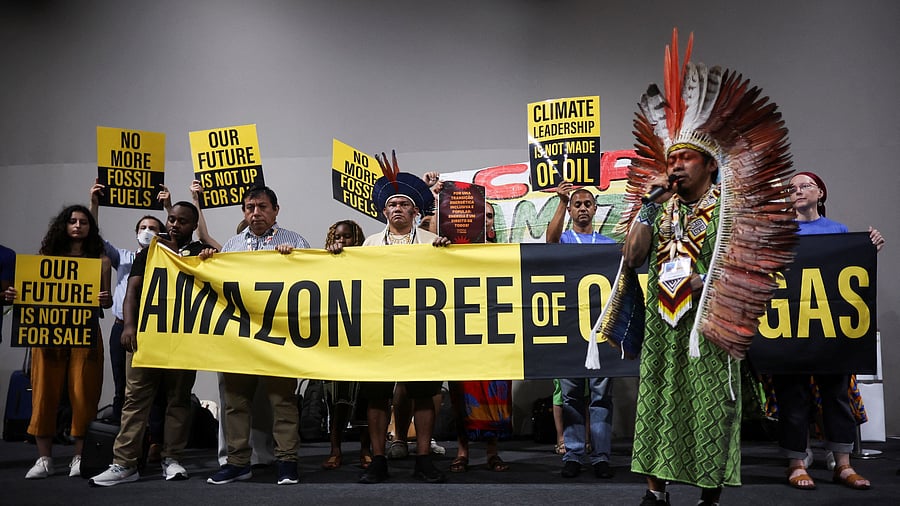
Activists and Indigenous people take part in a Stop EACOP campaign protest against fossil fuels during the UN Climate Change Conference (COP30) in Belem.
Credit: Reuters photo
The 30th session of the United Nations Framework Convention on Climate Change (UNFCCC) in Belém, Brazil, closed a day later than the scheduled November 21, as talks stalled and participating nations remained divided.
Despite the hectic efforts of the 30th Conference of the Parties (COP30) President Andre Aranha Correa do Lago and Brazilian President Luiz Inacio Lula da Silva, no agreement could be reached among 194 countries on roadmaps to transition away from fossil fuels and to stop deforestation.
Both proposals were moved by the host country and backed by nearly 90 countries.
However, an agreement was reached to triple the adaptation finance for developing countries from the current $40 billion annually to $120 billion by 2035. This amount would be part of the $300 billion pledged by developed countries at Baku during COP29 to mobilise for mitigation and adaptation strategies in the developing world. The $180 billion difference would be lent to the global south, but critics warn that the loan-heavy structure could push nations into debt traps.
Some other outcomes in COP30 agreement were to strengthen global health systems to cope better with the impacts of the climate change, opening planetary intelligence network launched for data interoperability to accelerate global climate transformation by unifying critical digital technology, global ethical stock-take to incorporate moral and ethical considerations and civil society dimensions into global climate action agenda, accelerate energy transition and expand supply of liquid biofuels, biogas, hydrogen and other renewables.
These outcomes would not help the planet meet the commitment to keep global warming below 1.5 °C above preindustrial levels. The biggest concern at the conference was the inadequacy of national climate plans, drawn up in line with the Nationally Determined Contributions (NDCs) under the Paris Accord, to meet the above commitment, which they are supposed to submit every five years. More than 70 countries, including India and Saudi Arabia, did not file NDCs.
Belém is located along the Pará River near the Amazon estuary. The city lies within the Amazon rainforest region, the world’s largest tropical rainforest, which extends across parts of nine South American countries, including French Guiana Forests worldwide, including this one, help maintain the carbon-oxygen equilibrium.
Brazil aims to lead global efforts to protect such tropical forests and has launched the Tropical Forests Forever Facility (TFFF), designed to mobilise $125 billion in public and private funding to reward countries that conserve and restore tropical forests. India has joined the initiative as an observer. The World Bank has agreed to manage the initiative as a multilateral trust fund. While TFFF was officially announced, it was not incorporated into the formal COP30 outcome document.
Earlier, on the sidelines of COP26 in Glasgow, countries controlling 90% of the world’s forests had pledged to end deforestation by 2030. Although India had not signed this pact, deforestation continues here, as in other countries. In reality, a total of 31% of Earth’s land surface is covered by various types of forests. Studies have also revealed that forests and land act as a net sink for nearly one-third of CO2 emissions. At future UN conferences, the UN must persuade countries to preserve all forests for humanity, and, accordingly, a framework must be structured. Efforts must be made to protect all types of forests worldwide, not just tropical ones.
Trump, who has previously withdrawn from the Paris Agreement, declined to send a high-level official delegation to represent US interests at COP30. Now China has presented itself as a leader in the fight against global warming. Its pavilion (which occupies prime space near the entrance, next to the host country, Brazil) dominated the entrance hall of sprawling COP30, and executives from the biggest clean energy company presented a green future to large English-speaking audiences.
In the COP28 resolution in Dubai, paragraph 28, under the heading ‘global stock-take’, mentions transitioning away from fossil fuels. Later, Saudi Arabian officials claimed that transitioning away from fossil fuels was not the real commitment; it was one among many options. When other countries opposed it in COP29 at Baku, they were stymied by overt and covert opposition.
When the UK, the EU, and other vulnerable countries took it up at COP30, it was argued that previous COP decisions cannot be erased but can be built upon, and that the roadmap for the phase-out is the best way forward. While Colombia moved toward a transition away from fossil fuels, supported by a dozen vulnerable countries in the ‘fossil fuel non-proliferation treaty’, some other countries and NGOs insisted on a roadmap.
On the 8th day of the conference, more than 80 countries from Africa, Asia, Latin America, and the Pacific joined with EU member states and the UK in making an impassioned plea to transition away from fossil fuels. It was the main issue, despite stiff opposition from petro states and other fast-growing economies such as Russia, China, India, and South Africa. The sharp division between the parties prevailed, and the proposal could not be added in agreement.
While COP30 was underway, Vietnam faced a surge on its eastern coast. The countries between the tropics of Cancer and Capricorn are continuously facing catastrophes such as floods, rainfall, heat waves, and sea surges. Amid such a situation, COP30 could not arrive at a roadmap for transitioning away from fossil fuels; it will be devastating for lives and livelihoods.
(The writer is a former head of the forest force in Karnataka)